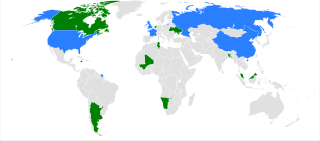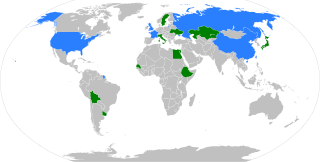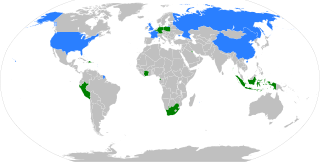
The G4 nations, comprising Brazil, Germany, India, and Japan, are four countries which support each other's bids for permanent seats on the United Nations Security Council. Unlike the G7, where the common denominator is the economy and long-term political motives, the G4's primary aim is the permanent member seats on the Security Council. Each of these four countries have figured among the elected non-permanent members of the council since the UN's establishment. Their economic and political influence has grown significantly in the last decades, reaching a scope comparable to the permanent members (P5). However, the G4's bids are often opposed by the Uniting for Consensus movement, and particularly their economic competitors or political rivals.

Reform of the United Nations Security Council (UNSC) encompasses five key issues: categories of membership, the question of the veto held by the five permanent members, regional representation, the size of an enlarged Council and its working methods, and the Security Council-General Assembly relationship. The Member States, regional groups and other Member State interest groupings developed different positions and proposals on how to move forward on this contested issue.

The United Nations Regional Groups are the geopolitical regional groups of member states of the United Nations. Originally, the UN member states were unofficially organized into five groups as an informal means of sharing the distribution of posts for General Assembly committees. Now this grouping has taken on a much more expansive and official role. Many UN bodies are allocated on the basis of geographical representation. Top leadership positions, including Secretary-General and President of the General Assembly, are rotated among the regional groups. The groups also coordinate substantive policy and form common fronts for negotiations and bloc voting.

The 2014 United Nations Security Council election was held on 16 October 2014 during the 69th session of the United Nations General Assembly, held at United Nations Headquarters in New York City. The elections were for five non-permanent seats on the UN Security Council for two-year mandates commencing on 1 January 2015. In accordance with the Security Council's rotation rules, whereby the ten non-permanent UNSC seats rotate among the various regional blocs into which UN member states traditionally divide themselves for voting and representation purposes, the five available seats were allocated as follows:

The 2012 United Nations Security Council election was held on 18 October 2012 during the 67th session of the United Nations General Assembly, held at the Headquarters of the United Nations in New York City. The elections were for five non-permanent seats on the UN Security Council for two-year mandates commencing on 1 January 2013 to replace the five countries whose terms expired. The countries elected were Argentina, Australia, Luxembourg, the Republic of Korea, and Rwanda with Luxembourg being elected for the first time.

The 2011 United Nations Security Council election was held on 21 and 24 October 2011 during the Sixty-sixth session of the United Nations General Assembly, held at United Nations Headquarters in New York City. The General Assembly elected Azerbaijan, Guatemala, Morocco, Pakistan, and Togo, as the five new non-permanent members of the UN Security Council for two-year mandates commencing on 1 January 2012. Azerbaijan was elected after 17 rounds on 24 October, while the other four new members were chosen on 21 October.

The 2001 United Nations Security Council election was held on 8 October 2001 at United Nations Headquarters in New York City during the 56th session of the United Nations General Assembly. The General Assembly elected five non-permanent members of the UN Security Council for two-year terms commencing on 1 January 2002.

The 1997 United Nations Security Council election was held on 14 October 1997 at United Nations Headquarters in New York City during the 52nd session of the United Nations General Assembly. The General Assembly elected five non-permanent members of the UN Security Council for two-year terms commencing on 1 January 1998.

The 2015 United Nations Security Council election was held on 15 October 2015 during the 70th session of the United Nations General Assembly, held at United Nations Headquarters in New York City. The elections are for five non-permanent seats on the UN Security Council for two-year mandates commencing on 1 January 2016. In accordance with the Security Council's rotation rules, whereby the ten non-permanent UNSC seats rotate among the various regional blocs into which UN member states traditionally divide themselves for voting and representation purposes, the five available seats are allocated as follows:

The 1999 United Nations Security Council election was held on 14 October 1999 during the Fifty-fourth session of the United Nations General Assembly, held at United Nations Headquarters in New York City. The General Assembly elected Bangladesh, Jamaica, Mali, Tunisia, and Ukraine, as the five new non-permanent members of the UN Security Council for two-year mandates commencing on 1 January 2000. Notably, Ukraine was elected to the Council for the first time as an independent nation.

The 2016 United Nations Security Council election was held on 28 June during the 70th session of the United Nations General Assembly, held at United Nations Headquarters in New York City. The elections were for five non-permanent seats on the UN Security Council for two-year mandates commencing on 1 January 2017. In accordance with the Security Council's rotation rules, whereby the ten non-permanent UNSC seats rotate among the various regional blocs into which UN member states traditionally divide themselves for voting and representation purposes, the five available seats were allocated as follows:

The 2017 United Nations Security Council election was held on 2 June 2017 during the 71st session of the United Nations General Assembly, held at United Nations Headquarters in New York City. In addition to the regular elections for five of the non-permanent seats on the UN Security Council, there was by-election for a sixth seat held by Italy who relinquished its seat at the end of the year as part of a term splitting agreement with the Netherlands. The regular elections are for two-year mandates commencing on 1 January 2018; the by-election is for the remainder of Italy's term. In accordance with the Security Council's rotation rules, whereby the ten non-permanent UNSC seats rotate among the various regional blocs into which UN member states traditionally divide themselves for voting and representation purposes, the five regularly available seats are allocated as follows:

The 2018 United Nations Security Council election was held on 8 June during the 72nd session of the United Nations General Assembly, held at United Nations Headquarters in New York City. The elections were for five non-permanent seats on the UN Security Council for two-year mandates commencing on 1 January 2019.

The 2020 United Nations Security Council election was held on 17 and 18 June 2020 during the 74th session of the United Nations General Assembly, held at United Nations Headquarters in New York City. The elections were for five non-permanent seats on the UN Security Council for two-year mandates commencing on 1 January 2021.

The 2022 United Nations Security Council election was held on 9 June 2022 during the 76th session of the United Nations General Assembly, held at United Nations Headquarters in New York City. The elections are for five non-permanent seats on the UN Security Council for two-year mandates commencing on 1 January 2023. In accordance with the Security Council's rotation rules, whereby the ten non-permanent UNSC seats rotate among the various regional blocs into which UN member states traditionally divide themselves for voting and representation purposes, the five available seats are allocated as follows:
The 2024 United Nations Security Council election will be held in mid-2024 during the 78th session of the United Nations General Assembly, held at United Nations Headquarters in New York City. The elections are for five non-permanent seats on the UN Security Council for two-year mandates commencing on 1 January 2025. In accordance with the Security Council's rotation rules, whereby the ten non-permanent UNSC seats rotate among the various regional blocs into which UN member states traditionally divide themselves for voting and representation purposes, the five available seats are allocated as follows:

The Group of Asia and the Pacific Small Island Developing States is one of the five United Nations regional groups and is composed of 53 Member States from Asia and Oceania.
The 2025 United Nations Security Council election will be held in mid-2025 during the 79th session of the United Nations General Assembly, held at United Nations Headquarters in New York City. The elections are for five non-permanent seats on the UN Security Council for two-year mandates commencing on 1 January 2026. In accordance with the Security Council's rotation rules, whereby the ten non-permanent UNSC seats rotate among the various regional blocs into which UN member states traditionally divide themselves for voting and representation purposes, the five available seats are allocated as follows:
The 2026 United Nations Security Council election will be held in mid-2026 during the 80th session of the United Nations General Assembly, held at United Nations Headquarters in New York City. The elections are for five non-permanent seats on the UN Security Council for two-year mandates commencing on 1 January 2027. In accordance with the Security Council's rotation rules, whereby the ten non-permanent UNSC seats rotate among the various regional blocs into which UN member states traditionally divide themselves for voting and representation purposes, the five available seats are allocated as follows:















